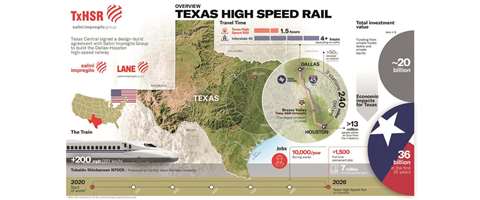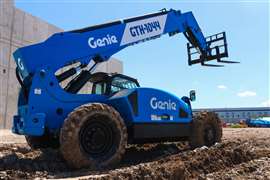Texas high-speed rail moves a step closer
11 May 2020
The construction of a high-speed rail line in Texas, US, has moved closer to becoming a reality after a ruling by the 13th Court of Appeals of Texas in favour of Texas Central, the project’s developer.

The Court held that Texas Central was both a railroad company and interurban electric railway, giving it the right to survey access and the use of eminent domain along the planned 379km trajectory of the line
It is reported that the US$20 billion project – which will be constructed by contractor Webuild – would lead to an estimated US$36 billion in economic benefits state-wide during the next 25 years, including the creation of 10,000 jobs per year during peak construction and 1,500 permanent jobs when fully operational.
“This decision is rooted in state law that allows survey access and use of eminent domain by railroads, pipelines, electrical lines and other industries that provide for the public good and a strong economy,” said Carlos Aguilar, chief executive of Texas Central.
“This decision confirms our status as an operating railroad and allows us to continue moving forward with our permitting process and all of our other design, engineering and land acquisition efforts.”
In September 2019, Texas Central announced the design-build contract authorising a set of early workers by a joint-venture between Webuild and its US subsidiary, Lane Construction Corporation.
The joint-venture is to supply the civil and infrastructure scope for the high-speed train service between Houston and Dallas. This includes the design and construction of the viaduct and embankment sections along the entire route, the installation of the track system and the alignment and construction of all buildings and services that will house maintenance and other rail system equipment.
The high-speed train, which will be based on Central Japan Railway’s Tokaido Shinkansen, will connect Dallas and Houston in 90 minutes at 30-minute intervals at peak hours with a stop at Brazos Valley near Texas A&M University. It is expected to reduce travel time by a total of 90 minutes compared with vehicle travel and one hour compared with plane travel, including boarding and disembarking times.
STAY CONNECTED


Receive the information you need when you need it through our world-leading magazines, newsletters and daily briefings.
CONNECT WITH THE TEAM










